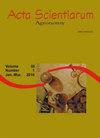黏性和沙质土壤木薯品种PROTOX抑制剂的选择性和有效性
IF 1.2
4区 农林科学
Q3 AGRONOMY
引用次数: 0
摘要
原生卟啉原氧化酶(PROTOX)抑制剂除草剂在木薯品种中的选择性和效果取决于产品配方、用量和土壤质地。研究了氟恶嗪和磺胺酮在木薯品种IPR B36和无性系vn117中的选择性和药效。进行了两个实验:一个在粘性土壤中,另一个在沙质土壤中。试验均采用裂区随机区组设计,设3个重复。以两个木薯品种为主区,分10个处理,分别为氟恶嗪50、75、100和125 g ha-1;磺胺酮剂量为250、500、750和1000 g ha-1;一种是无杂草控制,一种是无杂草控制。氟恶嗪(≥75 g ha-1)和磺胺酮(≥250 g ha-1)在施用后90天内对两种土壤的平均杂草控制率分别> 70%和90%。氟恶嗪对木薯品种的残留效应小于磺胺酮,特别是在粘土土壤中。氟恶嗪对种植在两种土壤类型下的不同木薯品种均有选择性,而磺胺酮在粘性土壤中选择性更强。PROTOX抑制剂对木薯地杂草生长有较好的抑制作用,且在选择性上不存在品种差异;但是,在沙质土壤中,磺胺酮的最大喷施量应限制在250克每公顷。本文章由计算机程序翻译,如有差异,请以英文原文为准。
Selectivity and efficacy of PROTOX inhibitors in cassava varieties cultivated in clayey and sandy soils
The selectivity and efficacy of protoporphyrinogen oxidase (PROTOX) inhibitor herbicides in cassava varieties depend on product formulation, dosage, and soil texture. The aim of this study was to assess the selectivity and efficacy of flumioxazin and sulfentrazone in the cassava variety ‘IPR B36’ and the clone ‘VN 117’. Two experiments were carried out: one in a clayey soil and one in a sandy soil. Both experiments were laid in a split-plot randomized block design with three replicates. The two cassava varieties were used as main plots, with subplots consisting in 10 treatments including, flumioxazin at 50, 75, 100, and 125 g ha-1; sulfentrazone at 250, 500, 750, and 1000 g ha-1; one weed-free control, and one unweeded control. Flumioxazin (≥75 g ha-1) and sulfentrazone (≥250 g ha-1) achieved mean weed control rates > 70 and 90% in both types of soil for up to 90 days after application. Flumioxazin exhibited fewer residual effects on the cassava varieties than sulfentrazone, particularly in clayey soil. Flumioxazin was selective to the different cassava varieties planted in both soil types, whereas sulfentrazone was more selective in clayey soil. PROTOX inhibitors were effective in controlling weed growth in cassava plots, and there were no varietal differences in herbicide selectivity; however, the use of sulfentrazone should be restricted to maximum spray rates of 250 g ha-1 in sandy soils.
求助全文
通过发布文献求助,成功后即可免费获取论文全文。
去求助
来源期刊

Acta Scientiarum. Agronomy.
Agricultural and Biological Sciences-Agronomy and Crop Science
CiteScore
2.40
自引率
0.00%
发文量
45
审稿时长
>12 weeks
期刊介绍:
The journal publishes original articles in all areas of Agronomy, including soil sciences, agricultural entomology, soil fertility and manuring, soil physics, physiology of cultivated plants, phytopathology, phyto-health, phytotechny, genesis, morphology and soil classification, management and conservation of soil, integrated management of plant pests, vegetal improvement, agricultural microbiology, agricultural parasitology, production and processing of seeds.
 求助内容:
求助内容: 应助结果提醒方式:
应助结果提醒方式:


